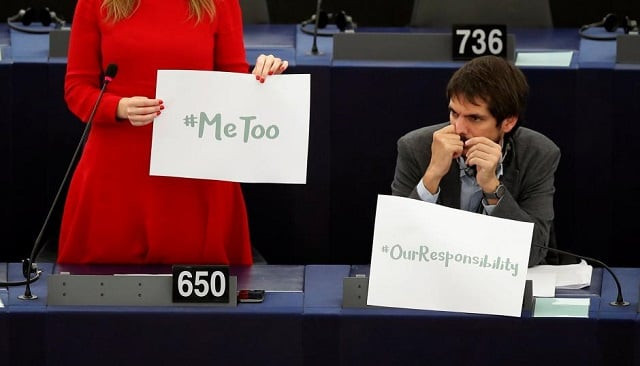Harassment?
An important distinction is required: feeling harassed is valid, regardless of the behaviour

European Parliament member Terry Reintke (L) holds a placard with the hashtag "MeToo" during a debate to discuss preventive measures against sexual harassment and abuse in the EU at the European Parliament in Strasbourg, France, October 25, 2017. REUTERS/Christian Hartmann
As per dictionary definitions, harassment is termed “aggressive persuasion or intimidation.” To intimidate is “to frighten, especially in order to do what one wants.” Harassment can range from misdemeanour to felony charges, where there is a credible threat of violence. “Credible threat of violence” means intentionally saying something or acting in a way that would make a reasonable person afraid for his or her safety or the safety of his or her family.
Inappropriate, on the other hand, is defined as “not proper or suitable in a particular circumstance,” while unethical is defined as “morally incorrect.” It is worth identifying behaviours in these categories, and having the necessary protocols in place at an institutional level for clarity in process and due diligence, particularly in the digital space with which regulations have yet to catch up. Harassment is not a term used lightly. To do so belittles the seriousness of such cases.
The complainant visited the hospital in the capacity of a patient seeking professional services, to later receive a friend request from the doctor who treated her. A request by definition requires consent. Facebook allows users to tweak settings over who can and cannot access accounts for requests. Further, once content is available to the public, one has no control over how the public will respond. It is for these reasons that privacy settings are available. For the doctor to have made the request and commented on photographs, which is clearly beyond the agreed scope of the patients’ visit, use of information, and professional services, was indeed a breach of conduct. To ponder on intent or what could have taken place thereafter is futile: we do not know, and nor is there evidence released to the public supporting a claim of threat such as showing up at the patient’s house, calling her mobile, etc. Therefore, does the behaviour meet the standard of harassment as defined?
An important distinction is required: feeling harassed is valid, regardless of the behaviour. Whether an action qualifies as harassment is another question altogether — they are not one in the same. We don’t hold people accountable for feelings experienced. We hold them accountable for behaviours exhibited.
Influence aside, the onus remains with the institute for resulting consequences in the way of policies. There were previous complaints about the doctor in question, raising a bigger issue: is there a culture of inappropriateness at the institute? Why were measures not taken earlier when complaints were filed? Did power dynamics play a role instead of clarity in process and due diligence? Are policies applicable to all complainants? Could this have been avoided altogether had the doctor been dismissed earlier for other breaches in conduct?
Moreover, to hold an entire nation accountable for the actions of one doctor is highly irresponsible, let alone untrue: the segregation of gender is commonplace here, in both public and private spaces precisely because of the respect for boundaries. Lastly, those who equate a doctor behaving inappropriately, unethically, or harassing a patient by sending a Facebook request, with the crimes of rape, molestation, unwanted touching, etc do a grave injustice to the victims of such heinous crimes and the resulting trauma experienced.
Published in The Express Tribune, November 1st, 2017.
Like Opinion & Editorial on Facebook, follow @ETOpEd on Twitter to receive all updates on all our daily pieces.
















COMMENTS
Comments are moderated and generally will be posted if they are on-topic and not abusive.
For more information, please see our Comments FAQ